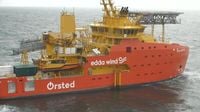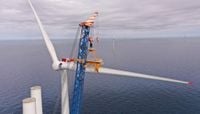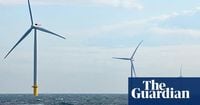On May 7, 2025, Ørsted, the Danish wind power giant, announced the cancellation of its Hornsea 4 offshore wind farm project, citing a surge in costs and risks associated with the development. This decision marks a significant setback for the UK's green energy ambitions, as Hornsea 4 was poised to contribute substantially to the nation’s renewable energy goals.
The Hornsea 4 project, located approximately 69 kilometers off the Yorkshire coast, was expected to feature around 180 turbines capable of generating 2.4 gigawatts (GW) of electricity—enough to power approximately 2.6 million homes. However, Ørsted's chief executive, Rasmus Errboe, explained that the project had encountered several adverse developments since securing a Contract for Difference (CfD) in September 2024, including rising supply chain costs, increasing interest rates, and heightened execution risks. "The combination of increased supply chain costs, higher interest rates, and increased execution risk have deteriorated the expected value creation of the project," Errboe stated.
Despite the cancellation, Ørsted has expressed its commitment to the UK’s offshore wind targets. Errboe emphasized that the company appreciates the government’s efforts to create a supportive framework for offshore wind development. "We remain fully committed to being an important partner to the UK government to help them achieve their ambitious target for offshore wind build-out," he said.
The cancellation of Hornsea 4 is expected to result in a financial impact of approximately DKK 3.5 billion to 4.5 billion (around £400 million to £513 million) in breakaway costs for Ørsted in the second quarter of 2025. This includes a writedown of offshore transmission assets and provisions for contract cancellation fees. Additionally, Ørsted anticipates impairing capitalized construction costs of DKK 0.5 billion to 1.0 billion.
Interestingly, while Ørsted's decision is a blow to the Hornsea project, the company reported a first-quarter operating profit of DKK 8.9 billion, a nearly 19% increase from the previous year. This growth was largely attributed to enhanced performance from its offshore sites, particularly the ramp-up of generation at the Gode Wind 3 offshore wind farm in Germany. However, the positive earnings were somewhat tempered by lower wind speeds experienced during the quarter.
The UK government has responded to Ørsted’s announcement, stating it will work with the company to get Hornsea 4 back on track. A spokesperson for the Department for Energy Security and Net Zero acknowledged the challenges posed by global inflation and supply chain constraints, emphasizing the government's commitment to a robust pipeline of renewable energy projects aimed at delivering clean power by 2030.
Industry experts have also weighed in on the implications of this cancellation. Dhara Vyas, chief executive of Energy UK, noted that wind power had overtaken gas as Great Britain's largest source of electricity in 2024, highlighting the importance of wind energy in reducing reliance on foreign fossil fuels. Vyas stated, "Not only will this boost energy security, it will grow our economy and bring down bills in the long-term." She added that the loss of such a significant project raises the stakes for the upcoming Contracts for Difference auction round, AR7.
Ørsted's decision to halt Hornsea 4 comes on the heels of previous project cancellations, including two major wind farms off the northeast coast of the United States, which were scrapped in late 2023 due to soaring costs. The company, which is majority-owned by the Danish government, has faced increased pressure from rising costs across the global wind power industry, which have been exacerbated by inflation and supply chain disruptions.
Despite the recent setbacks, Ørsted maintains a long-term belief in the fundamentals of offshore wind in the UK. Errboe stated, "We’ll keep the project rights for the Hornsea 4 project in our development portfolio, and we’ll seek to develop the project later in a way that is more value-creating for us and our shareholders." This sentiment reflects a cautious but optimistic outlook amidst challenging market conditions.
The Hornsea 4 project was initially greenlit by the UK government in July 2023 and was seen as a crucial component of the country’s renewable energy strategy. With a capacity of 2.6 GW, it was the second-largest wind farm to receive government approval, trailing only the Hornsea 3 project, which has a capacity of 2.8 GW and is scheduled for completion in 2027. The first two phases of the Hornsea development are already operational, contributing significantly to the UK’s renewable energy output.
This latest cancellation highlights the ongoing challenges faced by the offshore wind sector, as developers navigate a landscape marked by increasing costs and regulatory hurdles. As the industry looks ahead, the importance of stable market conditions and supportive government policies will be paramount in ensuring the success of future projects.
In summary, Ørsted's decision to discontinue the Hornsea 4 project underscores the complexities of developing large-scale renewable energy initiatives in today's economic climate. The company will continue to evaluate options for future development while remaining committed to its role in supporting the UK’s ambitious offshore wind targets.






